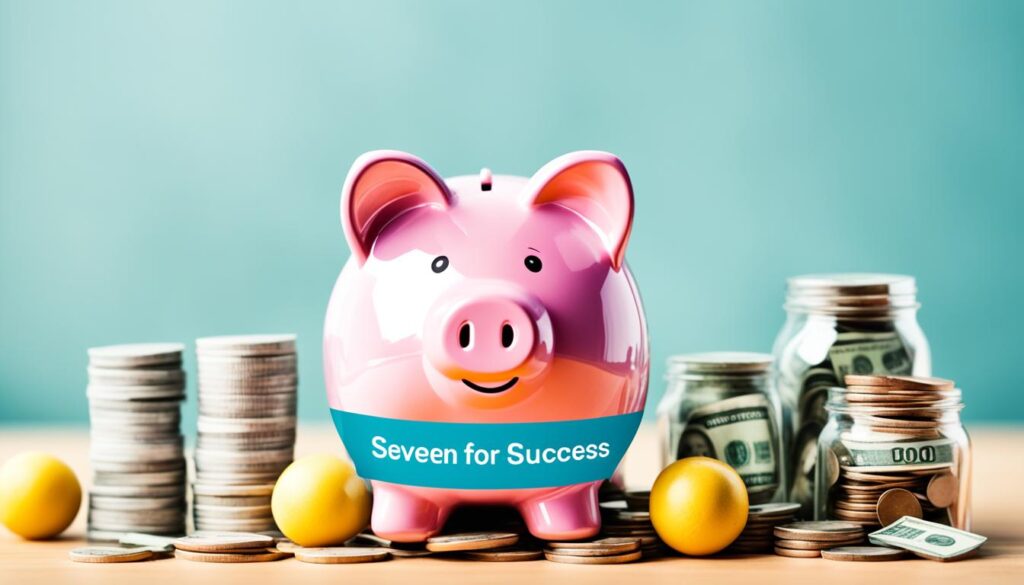Debt can be tough to handle, but there are many ways to get your money under control. At Straight Fire Money, we know how hard it can be to deal with lots of different debts. We’re here to show you 12 good ways to combine your debts and get on the path to financial freedom. By using these methods, you can make your debts simpler, maybe pay less interest, and have a clear plan to become debt-free.
The average person owes about $8,000 on their credit cards. Credit cards usually charge around 20% interest, which is a lot. Personal loans often have lower rates, around 12%. This is why many people look into debt consolidation. It’s usually best for people with credit scores above 680. Most consolidation loans are between $10,000 and $20,000.
Consolidating your debts can make your finances simpler and save you money on interest. But it’s important to be careful not to create new debt while you’re paying off the old. There are other options too, like balance transfers or debt management plans. Just remember, consolidating might temporarily lower your credit score, and it’s not a fix for ongoing money problems. It’s a good idea to compare offers from different lenders and think about all the costs involved.
1. The Snowball Method: A Psychological Boost to Debt Repayment

The snowball method is a popular way to pay off debt. You start by paying off your smallest debts first while still paying the minimum on bigger debts. This method gives you quick wins and helps you stay motivated. It’s like when you clean your room – starting with the easy stuff makes you feel good and want to keep going.
The snowball method helps you build momentum and stay motivated. It makes managing your debts easier by getting rid of the small ones first. You can use this method along with other ways of consolidating debt to get the best results. It’s really good for people who find it hard to stay motivated when paying off debt for a long time. Each small debt you pay off gives you a boost and shows you’re making progress. Learn more about how the snowball method compares to other debt consolidation options, and see how this strategy can work for your specific money situation.
2. Personal Loans: Consolidating Debt with a Single Payment
Personal loans are a common way to consolidate debt. They let you combine multiple debts into one fixed monthly payment. This can make your finances simpler and might lower the overall interest you pay. It’s like putting all your toys in one big box instead of having them scattered all over your room – it’s easier to manage.
When looking at personal loans for debt consolidation, it’s important to compare interest rates from different lenders. Check if there are any fees for setting up the loan or paying it off early. Make sure the loan term (how long you have to pay it back) fits with your money goals. Look for lenders that offer good rates and flexible terms. Calculate how much the loan will cost in total, including all fees and interest, to make sure it’s a good deal for you. Discover strategies for becoming debt-free before 30, including the use of personal loans, and learn how to use this option as part of a bigger plan to reduce your debt.
3. Balance Transfer Credit Cards: Leveraging Low Introductory Rates

Balance transfer credit cards offer a way to move high-interest credit card debt to a new card with a low or 0% interest rate for a certain time. This can help you save a lot on interest if you use it right. It’s like getting a free pass to pay off your debt without extra charges for a while, usually 12 to 18 months.
When thinking about balance transfer cards, look for ones with long 0% interest periods. Be aware of any fees for transferring your balance, and make a plan to pay off the debt before the special rate ends. This method can work well with other ways of consolidating debt. It’s important to figure out the total cost of transferring your balance, including any fees, and compare it to what you’d pay in interest on your current cards. Also, promise yourself not to use the old cards for new purchases while you’re paying off the transferred balance.
4. Home Equity Loans: Tapping into Your Property’s Value
If you own a home and have built up equity (the part of your home you actually own), a home equity loan can be a good way to consolidate debt. These loans often have lower interest rates than personal loans because your house acts as security for the loan. By borrowing against your home’s value, you can get a lump sum of money to pay off high-interest debts, potentially saving a lot in interest over time.
Important things to think about when using home equity for debt consolidation include understanding the risks of using your home as security, comparing terms and rates from different lenders, and thinking about how it will affect your home’s value in the long run. It’s crucial to know that if you can’t repay a home equity loan, you could lose your home, so be very careful with this option. Also, think about closing costs and any possible changes in your home’s value when deciding if this is right for you. Explore effective debt management strategies, including the use of home equity, and learn how to fit this option into a big-picture financial plan that matches your long-term goals.
5. Debt Management Plans: Professional Assistance in Debt Consolidation

Debt management plans involve working with a professional to create a structured repayment plan. They can help negotiate lower interest rates and fees with the people you owe money to. With a debt management plan, you usually close your credit accounts and make one monthly payment to the credit counseling agency. They then split this money among your creditors based on the plan they’ve negotiated.
Benefits of debt management plans include getting expert help throughout the debt repayment process, possibly getting lower interest rates and fees waived, and the ease of making just one monthly payment. These plans can be really helpful for people struggling with multiple unsecured debts, like credit cards and personal loans. However, it’s important to choose a trustworthy credit counseling agency and understand that starting a debt management plan might affect your credit score in the short term. Think about the long-term benefits of learning about money and getting support from these programs when comparing this option to other debt consolidation strategies.
6. Peer-to-Peer Lending: Alternative Financing for Debt Consolidation
Peer-to-peer lending platforms connect borrowers directly with individual lenders, often offering competitive rates for debt consolidation loans. This option can be particularly useful for those with good credit scores looking for alternatives to traditional bank loans. P2P lending platforms typically use technology to make the application and approval process faster and easier, which can mean you get your money quicker than with traditional loans.
Key things about peer-to-peer lending include potentially lower interest rates than traditional loans, a quick and easy online application process, and a variety of loan terms and amounts available. When thinking about P2P lending, be sure to compare rates and terms across multiple platforms, as they can be quite different. Also, look at the platform’s reputation, customer service, and any fees that come with the loan. While P2P lending can offer more flexible terms and potentially lower rates, it’s important to be just as careful and do as much research as you would with any other financial product. Learn how to improve your financial discipline and explore alternative lending options, including how P2P lending can fit into a broader strategy for debt consolidation and financial improvement.
7. 401(k) Loans: Borrowing from Your Retirement Savings

While it’s not always recommended, borrowing from your 401(k) to consolidate debt can be an option if you don’t have many other choices. This approach lets you borrow from yourself, often at lower interest rates than other types of loans. With 401(k) loans, you can usually borrow up to half of your vested balance or $50,000, whichever is less, and pay it back through deductions from your paycheck over up to five years.
Important things to think about when using a 401(k) loan for debt consolidation include understanding how it will affect your retirement savings, knowing the repayment rules (especially if you leave your job), and thinking about what you might miss out on by taking money out of your investments. It’s important to know that while you’re paying yourself back with interest, you’re missing out on potential gains in the market during that time. Also, if you can’t pay back the loan according to the terms, it might be treated as if you took the money out early, which can mean taxes and penalties. Carefully weigh the short-term benefits of debt consolidation against the long-term effects on your retirement savings before choosing this strategy.
8. Debt Consolidation Programs: Structured Repayment Plans
Debt consolidation programs, offered by various financial institutions, provide a structured way to combine and repay multiple debts. These programs often include education about money and support to help you stay on track. Unlike debt management plans, which are usually run by non-profit credit counseling agencies, debt consolidation programs are typically offered by for-profit companies and might involve taking out a new loan to pay off existing debts.
Key features of debt consolidation programs include customized repayment plans based on your financial situation, the potential for reduced interest rates and fees, and ongoing support and resources to help you learn about managing money. These programs can be particularly helpful for those who need a more comprehensive approach to debt repayment and financial management. When considering a debt consolidation program, be sure to research the company thoroughly, understand all fees and terms associated with the program, and compare it with other debt consolidation options to ensure it’s the best fit for your needs. Explore frequently asked questions about debt consolidation and repayment strategies, including how structured programs can complement other debt reduction methods.
9. Cash-Out Refinancing: Leveraging Home Equity for Debt Consolidation

For homeowners with a lot of equity, cash-out refinancing allows you to refinance your mortgage for more than you owe and use the extra cash to pay off other debts. This option can potentially lower your overall interest rate and simplify your debt payments. By replacing your current mortgage with a new, larger loan, you can access the value in your home to consolidate high-interest debts into a single, potentially lower-interest payment.
Things to think about for cash-out refinancing include comparing the new mortgage terms with your current loan, factoring in closing costs and fees, and understanding how it will affect your home equity and overall financial picture in the long run. It’s important to know that while this option can provide immediate debt relief, it also means you’ll be paying off your mortgage for a longer time and using your home as security for the loan. Carefully calculate the total cost of refinancing, including any changes to your mortgage interest rate and how long you’ll be paying it, to make sure it’s a cost-effective solution for your debt consolidation needs. Also, think about how it might affect your taxes and talk to a financial advisor to understand how this strategy fits into your long-term financial goals.
10. Debt Settlement: Negotiating with Creditors
Debt settlement involves trying to get the people you owe money to agree to let you pay less than the full amount you owe. While this can provide significant debt relief, it often comes with risks and can negatively impact your credit score. In a debt settlement program, you typically stop making payments to your creditors and instead save money in a special account. Once you have enough saved up, the debt settlement company tries to negotiate with your creditors to accept a lump sum payment that’s less than the full amount you owe.
Key points about debt settlement include that it’s best for people in serious financial trouble, it can have long-lasting negative effects on your credit scores, and there might be tax consequences for debt that’s forgiven. It’s important to understand that creditors don’t have to accept settlement offers, and the process can take several years to complete. During this time, your credit score may go down a lot, and you might face legal action from creditors. Also, any forgiven debt over $600 may need to be reported to the IRS as income you have to pay taxes on. Before considering debt settlement, look into all other debt consolidation options and talk to a financial advisor to understand all the implications of this strategy. Learn more about achieving debt-free living through various strategies, including how debt settlement compares to other debt reduction methods.
11. Side Gigs and Extra Income: Accelerating Debt Repayment

While not a traditional consolidation method, increasing your income through side jobs or part-time work can give you extra money to pay off debt faster. This approach can be combined with other consolidation strategies for the best results. By using money from side jobs just for paying off debt, you can make big progress without relying only on cutting your budget or taking out new loans.
Benefits of increasing income for debt repayment include paying off debt faster without new loans, possibly learning new skills and finding career opportunities, and being able to adjust your efforts based on your financial needs. When looking for side gigs, think about options that match your skills and interests, like freelancing, tutoring, or driving for ride-sharing services. It’s important to manage your time well and think about how extra income might affect your taxes. Make a plan to use this extra money efficiently, focusing on high-interest debts or boosting your debt snowball efforts. Remember that while making more money can help you pay off debt faster, it’s also important to keep a good balance between work and life and avoid getting too tired.
12. Lifestyle Changes and Budgeting: The Foundation of Debt Consolidation

Successful debt consolidation often requires big changes in how you spend money and manage your finances. Making a strict budget and changing your lifestyle can really help you pay off debt. These changes are the foundation of any good debt repayment strategy, making sure you not only deal with current debts but also prevent future money problems.
Key strategies for lifestyle changes include creating and sticking to a realistic budget, finding and cutting out unnecessary expenses, and developing good money habits for long-term success. Start by tracking all your expenses for a month to get a clear picture of how you spend money. Look for areas where you can cut back, like eating out, subscription services, or entertainment expenses. Think about living a simpler lifestyle to reduce how much you buy and focus on what you really need. Get into the habit of planning meals and cooking at home to save money on food. Also, look for free or cheap alternatives for fun activities. Remember that small changes can add up to big savings over time. Discover how to become completely debt-free before 30 through lifestyle changes and smart financial planning, and learn how to include these basic changes in your overall plan to reduce debt.
Conclusion: Choosing the Right Debt Consolidation Option for You

Debt consolidation offers many ways to simplify your debts and work towards being debt-free. At Straight Fire Money, we encourage you to carefully think about each method and choose the one that best fits your unique money situation. Remember, successful debt consolidation requires commitment, discipline, and a clear understanding of your financial goals. It’s not just about finding the right strategy, but also about changing your money habits and mindset to ensure long-term success.
Whether you choose the snowball method, a personal loan, or a mix of strategies, the key is to take action and stick to your debt repayment plan. By exploring these debt consolidation options and putting a solid financial strategy in place, you’re taking important steps towards regaining control of your finances and building a more secure financial future. Consider creating a detailed action plan that outlines your chosen consolidation method, repayment timeline, and specific milestones to track your progress.
Remember, if you’re not sure which debt consolidation option is right for you, don’t hesitate to ask for professional financial advice. A financial advisor can help you look at your unique situation, consider things like your credit score, how stable your income is, and your long-term financial goals, and recommend the best approach for you. With the right approach and dedication, you can overcome your debt and achieve the financial freedom you deserve. Stay focused on your goals, celebrate small victories along the way, and stay committed to improving your finances. Learn more about tackling debt effectively and find answers to common questions about debt consolidation strategies, empowering yourself with the knowledge and tools needed to make informed decisions about your financial future.

